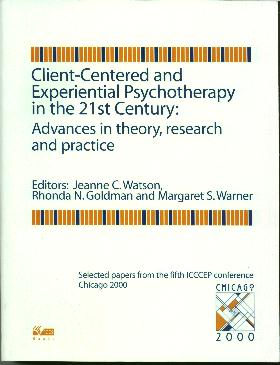
Watson, Jeanne C. / Goldmann, Rhonda N. / Warner, Margaret S. (Eds.)
Client-centered and experiential psychotherapy
in the 21st century:
Advances in theory, research and practice
Ross-on-Wye (PCCS) 2002, 506 pages,
Paperback ISBN
1-898059-43-8,
£ 20 [30 EUR]
Hardback ISBN
1-898059-49-7,
£ 35.
contribution by P. F. Schmid
The necessary and
sufficient conditions of being person-centered”
On identity, integrity, integration and
differentiation of the paradigm
(pp.36-51)
Contributions by
Baljon, Marijke C. • Becker, Martina • Behr,
Michael •
Bohart, Arthur C. • Bozarth, Jerold D. • Brodley,
Barbara T. • Coffeng, Ton • Eckersell, Will •
Ellingham, Ivan • Gaylin, Ned L. • Glick, Meredith
J • Goldman, Rhonda • Grafanaki, Soti •
Greenberg, Leslie S. • Hannon,
J. Wade • Hawtin, Sarah • Hayashi, Sachiko •
Hendricks, Marion N. • Iberg, James • Jaison, Bala
• Kahn, Edwin • Kara, Atsushi • Krycka, Kevin C.
• Lambo, Deb • Leijssen, Mia • Lietaer, Germain
Lovering, Ann, • Missiaen, Claude •
Mitchell-Williams, Zinnia • Moon, Kathryn •
Pörtner, Marlis • Proctor, Gillian • Prosser,
Meghan • Purton, Campbell • Raskin, Nathaniel •
Rogers, Natalie • Rushanski-Rosenberg, Rachel •
Schmid, Peter F. •
Sikkema, Bob • Stiles, William B. • Stinckens,
Nele • Stumm, Gerhard • Tolan, Janet • Van Der
Moolen, Carla R. • Van Kalmthout, Martin •
Warner, Margaret S. • Watson, Jeanne C. • Wilkins,
Paul
Contents
LIETAER,
GERMAIN (2002), The client-centered/experiental
paradigm in psychotherapy: Development and
identity, in: Watson, Jeanne C. / Goldman, Rhonda
N. / Warner, Margaret S. (2002) (Eds..), Client-centered
and experiential psychotherapy in the 21st
century. Advances in theory, research and
practice, Ross-on-Wye (PCCS) 2002, 1-15
ELLINGHAM, IVAN (2002), Foundation for a
person-centred, humanistic psychology and beyond:
The nature and logic of Carl Rogers’ “formative
tendency”, in: Watson, Jeanne C. / Goldman, Rhonda
N. / Warner, Margaret S. (2002) (Eds..), Client-centered
and experiential psychotherapy in the 21st
century. Advances in theory, research and
practice, Ross-on-Wye (PCCS) 2002, 16-35
SCHMID, PETER F. (2002), The necessary and
sufficient conditions of being person-centered: On
identity, integrity, integration and
differentiation of the paradigm, 36-51
HENDRICKS, MARION N. (2002), What difference does
philosophy make? Crossing Gendlin and Rogers,
52-63
HAWTIN, SARAH (2002), The organismic valuing
process and ethics in person-centred theory, 64-72
HAYASHI, SACHIKO / KARA, ATSUSHI (2002),
Understanding the self through Taoist emptiness,
73-78
PROCTOR, GILLIAN (2002), Power in person-centred
theory, 79-88
PURTON, CAMPBELL (2002), Focusing and focusing:
The practice and the philosophy, 89-98
KAHN, EDWIN (2002),
Heinz Kohut’s empathy, 99-104
RASKIN,
NATHANIEL (2002), Rogers’ empathy. A revolutionary
innovation, 105-107
STUMM, GERHARD (2002), The person-centered
approach and self psychology, 108-126
VAN KALMTHOUT, MARTIN (2002), The farther reaches
of person-centered psychotherapy, 127-143
TOLAN, JANET (2002), The fallacy of the “Real”
Self: In praise of self structure, 144-149
BEHR, MICHAEL / BECKER, MARTINA (2002), Congruence
and experiencing emotions: Self-report scales for
the person-centered and experiential theory of
personality, 150-167
BOZARTH, JEROLD D. (2002), Empirically supported
treatment: Epitome of the “Specificity Myth”,
168-181
BRODLEY, BARBARA T. (2002), Observations of
empathic understanding in two client-centered
therapists, 182-203
GREENBERG, LESLIE S. / RUSHANSKI-ROSENBERG, RACHEL
(2002), Therapist’s experience of empathy, 204-220
IBERG, JAMES (2002), Psychometric development of
measures of in-session focusing activity: The
focusing- oriented session report and the
therapist ratings of client focusing activity,
221-246
KRYCKA, KEVIN C. / LAMBO, DEB (2002), Gendlin’s
edge: Making fresh sense out of gay and lesbian
experience, 247-257
BOHART, ARTHUR C. (2002), A passionate critique of
empirically supported treatments and the provision
of an alternative paradigm, 258-277
GRAFANAKI, SOTI (2002), On becoming congruent: How
congruence works in person-centred counselling and
practical applications for training and practice,
278-290
WILKINS, PAUL / MITCHELL-WILLIAMS, ZINNIA (2002),
The theory and experience of person-centred
research, 291-302
WATSON, JEANNE C. / PROSSER, MEGHAN (2002),
Development of an observer rated measure of
therapist empathy, 303-314
BALJON, MARIJKE C. (2002), Focusing in
client-centred psychotherapy supervision: Teaching
congruence, 315-324
COFFENG, TON (2002), Two phases of dissociation,
two languages, 325-338
GAYLIN, NED L. (2002), The relationship: The heart
of the matter, 339-347
HANNON, J. WADE / ECKERSELL, WILL (2002), Infusing
client-centered/person-centered counseling into a
traditional counselor education program, 348-355
JAISON, BALA (2002), Integrating experiential and
brief therapy models: A guide for clinicians,
356-369
MISSIAEN, CLAUDE (2002), Client-centered group
psychotherapy: Six theses put to the test. A
contribution from practice, 370-379
PÖRTNER, MARLIS (2002), Psychotherapy for people
with special neEds.: A challenge for client-centered
psychotherapists, 380-386
ROGERS, NATALIE (2002), Person-centered expressive
arts therapy. A path to wholeness, 387-399
SIKKEMA, BOB (2002), Unconditionality: Being
present in an attentive way to help translate
thoughts into the language of feeling, 400-405
STILES, WILLIAM B. / GLICK, MEREDITH J. (2002),
Client-centered therapy with multi-voiced clients:
Empathy with whom?, 406-414
STINCKENS, NELE / LIETAER, GERMAIN / LEIJSSEN, MIA
(2002), Working with the inner critic: Fighting
“the enemy” or keeping it company, 415-426
GOLDMAN, RHONDA (2002), The two-chair dialogue for
inner conflict, 427-447
VAN DER MOOLEN, CARLA R. (2002), Doctor, please
make me well again! On clients having severe
subjective health complaints (the Somatoform
Disorder), 448-458
WARNER, MARGARET S. (2002), Luke’s dilemmas: A
client-centered/experiential model of processing
with a schizophrenic thought disorder, 459-472
LOVERING, ANN (2002), Person-centered and feminist
theories: How we connect them in our work with
groups of Mexican women, 473-484
MOON, KATHRYN (2002), Nondirective client-centered
work with children, 485-492
|
Jerold Bozarth, USA, September 2002
|
Further info: www.pccs-books.co.uk
![]() Overview books &
order form
Overview books &
order form ![]() Bibliography Peter F.
Schmid
Bibliography Peter F.
Schmid
![]() English mainpage
English mainpage
![]()
![]() Hauptmenü deutsch
Hauptmenü deutsch